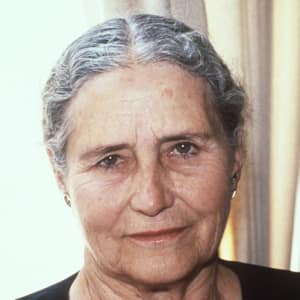
Doris Lessing
Winner of the 2007 Nobel Prize in Literature, Doris Lessing wrote across a range of genres and detailed the conflicts inherent to a changing society.
Synopsis
Doris Lessing was born in Kermanshah, Persia (present-day Iran), on October 22, 1919. After growing up in Rhodesia (now Zimbabwe), she moved to England and embarked upon a writing career. Her first novel was published in 1950 and her 1962 novel The Golden Notebook turned her into a feminist role model. The author of more than 55 works spanning fiction, nonfiction, poetry and opera, Lessing became the oldest recipient of the Nobel Prize for Literature in 2007, at the age of 88. She died in 2013, at age 94.
Early Life
Doris Lessing was born Doris May Tayler on October 22, 1919, in Kermanshah, Persia (now Iran). Her British parents had met while her father was recuperating from injuries he had sustained in World War I. Not wanting to stay in England after the war, Tayler's father took a job overseas.
In 1925, the family decamped to a farm in Rhodesia (present-day Zimbabwe), an endeavor that wasn't successful. After a difficult childhood, Taylor chose to leave school at 14. She held a number of different jobs—including as a nursemaid, telephone operator, office worker and journalist—before marrying in 1939.
Tayler had two children with her husband, but felt stifled by conventional life in the suburbs. She soon became involved with Rhodesia's Communist party. After divorcing in 1943, Tayler married a fellow party member, Gottfried Lessing, in 1945, and took his surname becoming Doris Lessing. Four years later, her second marriage also ended in divorce.
Writing Career
Along with her son from her second marriage, Lessing then moved to England. She brought a manuscript with her, which became her first published novel: The Grass Is Singing (1950). The book examined the relationship between a white farmer's wife in Rhodesia and her black house servant.
Lessing would soon produce other notable books with African backdrops, including a series of novels that featured protagonist Martha Quest. However, the work that made her literary reputation was her 1962 novel The Golden Notebook, which centered on a struggling female writer. The book was widely read and embraced by the growing women's movement.
Lessing's prodigious output also contains fantasy and science fiction novels—such as the series Canopus in Argos: Archives—as well as plays, short stories, essays and two autobiographies. She also wrote under the pseudonym Jane Somers. Using a different name permitted Lessing to demonstrate how difficult it was for unknown novelists to gain a foothold in the literary world.
Beliefs and Controversies
Throughout her life, Lessing rarely shied away from speaking her mind. She was barred for years from entering both Rhodesia and South Africa because she expressed her disapproval of white minority rule. Following the crackdown in Hungary in 1956, she turned away from Communism.
The Golden Notebook may have transformed Lessing into a feminist icon. However, Lessing was reluctant to accept that role and during a talk in 1970, she suggested there was more to discuss beyond feminism, "I've got the feeling that the sex war is not the most important war going on, nor is it the most vital problem in our lives."
Awards and Honors
The accolades Lessing received throughout her long career include the Somerset Maugham Award (1954), France's Prix Médicis (1976) and being shortlisted multiple times for the Man Booker Prize. In 1999, she was recognized by the British government as a Companion of Honour.
Most notably, Lesson was awarded the Nobel Prize in Literature in 2007. She was only the 11th woman to become a Nobel laureate in literature and the oldest recipient, at the age of 88. Upon winning, she told reporters, "I've won all the prizes in Europe, every bloody one. I'm delighted to win them all, the whole lot. It's a royal flush."
Death & Legacy
Doris Lessing died peacefully at her London home on November 17, 2013, at the age of 94. The prolific author left a legacy of more than 55 works that spanned literary genres, weaving rich narratives of her personal experiences and political perspectives.



